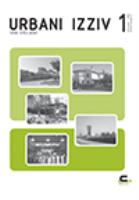Tracing post-communist urban restructuring: Changing centralities in central and eastern European capitals
Tracing post-communist urban restructuring: Changing centralities in central and eastern European capitals
Author(s): Janez Koželj, Jasna MariottiSubject(s): Marxist economics, Rural and urban sociology
Published by: Urbanistični inštitut Republike Slovenije
Keywords: centralities; decentralisation; fragmentation; peripheries; post-communist cities
Summary/Abstract: Rapid political and economic changes after the collapse of communism led to dynamic processes of urban restructuring in cities, replacing old patterns and models of growth with ones in which capital and the market economy were central to growth and development. The transformation towards a market economy and the reintroduction of land ownership required the establishment of a new and decentralised decision-making system, with direct consequences for cities’ structure and form. As part of these urban transformations, there were clear changes in location patterns of retail structures in cities, illustrating diverse patterns of post-communist cities’ spatial organisation. This article explores and provides insight into some special features of this transformation, both before and after the collapse of communism, in Bucharest, Budapest, Prague and Sofia. Examining these cities offers an overview of post-communist spatial restructuring processes and explores their changing centralities, which ultimately led to fragmented cities and disintegrated urban fabric. This comparative study also outlines how different development patterns can arise in cities that shared a similar past.
Journal: Urbani izziv
- Issue Year: 27/2016
- Issue No: 1
- Page Range: 113-122
- Page Count: 10
- Language: English

